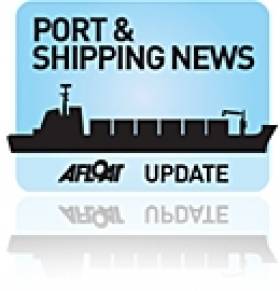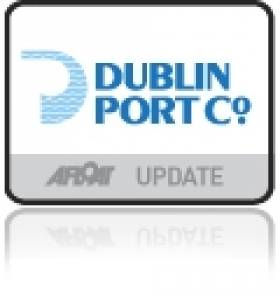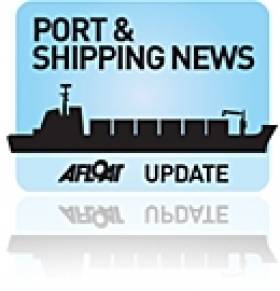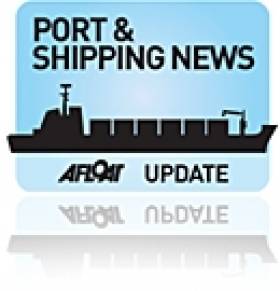Displaying items by tag: UNCTAD
#President&Ports - Senior port managers from developing countries who are passing on their expertise to colleagues met President Michael D. Higgins in Dublin, on 21 June during the week-long United Nations Conference on Trade & Development's Training of Trainers workshop.
President Higgins welcomed the managers from ports in Indonesia, Ghana, Malaysia, Nigeria, and the Philippines which are members of the English-speaking network of UNCTAD’s Train for Trade port management programme. Prospective members from Serbia and a former member from Namibia were also present.
"As an island nation, almost uniquely dependent on international trade, we in Ireland know and value the importance of our ports, and all who work there," Mr. Higgins said during a reception at Áras an Uachtaráin, his official residence.
The workshop was co-organized by Dublin Port Company, with the support of Port of Cork Company and Belfast Harbour Commissioners and held at the head office of Dublin Port Company and the National College of Ireland.
Prosperity for all
“I am so very proud that our ports here in Ireland and Irish Aid, our overseas development assistance programme, have been participating with the English-speaking network for eleven years now, and that they have agreed to continue for four more years,” Mr. Higgins said.
“It is an example of internationalization in the best sense, co-operative not competitive, dedicated to the prosperity of all the peoples of the world rather than a narrow few.”
The face-to-face workshop was the completion of a course that started with a distance learning component from April to June which represented a new blended learning strategy for the Port Management Programme.
The objective of the workshop was to prepare the senior port managers for their roles as future instructors in their port communities.
UNCTAD Secretary-General Mukhisa Kituyi was due to take part in the closing ceremonies of the workshop to distribute the certificates to successful candidates.
#Ports&Shipping - UNCTAD Deputy-Secretery at the TrainForTrade port management programme said ports in developing countries must be managed efficiently using modern methods to support international trade and boost local economies.
The Deputy-Secretary General Isabelle Durand was at a coordination meeting of the French-speaking network of the UNCTAD United Nations Conference on Trade and Development, which highlighted the challenges ports in the global South face match their importance in the global economy.
"As much as 80% of the volume of goods in the world are transported by ship," Ms. Durant said at the opening of the session, taking place in Geneva, 9–11 April.
"In addition to managing the goods they receive on time, ports – which are essential links in the global value chains – must prepare for the effects of climate change, rising temperatures, rising waters and of the emergence of extreme weather phenomena."
The meeting in Geneva of the francophone network is as part of Port Management Week that concludes today. More than 60 participants from 20 countries, are taking part in the event, which is supported by Irish Aid, Dublin Port Company, Port of Cork Company, and Belfast Harbour Commissioners.
TrainForTrade is supported by the ports of Nantes and Marseille in France, Dublin and Cork in Ireland, Belfast in the United Kingdom of Great Britain and Northern Ireland, and Gijon and Valencia in Spain.
Port training
Other hazards include economic and financial instability and threats linked to cybercrime, Ms. Durant added.
With 59% of global exports and 64% of global imports passing through a developing country port, maritime transport and port infrastructure remain at the heart of economic and social development in developing countries.
It takes a village
With a well-organized port sector, trade volumes increase as transport costs decrease, economic competitiveness is boosted, and jobs are created – but modern port management requires that this is done while respecting social equity, preserving resources and respecting the environment. And as regulations evolve, the complexity of managing ports increases.
"The TrainForTrade programme brings together ports from all over the world in a single ‘village’ where information becomes power and a tool for the development and modernization of our ports," Tanzania Port Authority Operations Manager Ebel Mwasenga said.
Building bridges
TrainForTrade helps bring efficiencies to developing country ports by encouraging trainees to look anew at their workplace and devise innovative solutions.
For instance, Togo port manager Koessanh Komlan Amatchoutchoui improved crew well-being and efficiency by building a footbridge in the port of Lomé which helps sailors to disembark while their boats are docking.
In another case, TrainForTrade graduates installed an electronic system for tracking outages on the Intranet network of the port of Dakar, Senegal – more than 21 kilometers of cables and optical fibers. This made it possible to reduce the time it took to identify frequent outages from one day to one hour, increasing port productivity.
In Benin, a new system for assigning dockworkers has proved highly profitable thanks to an optical reading of fingerprints at the entrance to the Port of Cotonou. This resulted in the better filtering of accredited employees, and a more judicious distribution of dockworkers at loading and unloading docks.
The TrainForTrade Port Management Programme also supports port communities in developing countries through networks of public, private, national and international institutions.
"In Haiti, there is no training in port management," Haiti’s TrainForTrade manager Oswald Rousseau said.
Training of trainers
The UNCTAD programme focuses on the development of human resources and fills this training gap.
Training is not only structured around exchanges of experience and best practice between countries of the global North and the global South, but also, thanks to the existence of a solid global network, between countries in Asia, Africa and the Americas.
UNCTAD also ensures that the impact of its programme is multiplied through the training of trainers, guaranteeing that its effect is felt not just in the same port, but also in port facilities of other developing countries.
In addition, with information and communication technologies, training can be provided at a distance, allowing a larger number of people to take part at low cost. UNCTAD issues an internationally recognized high-level "port certificate".
Trade, upgrade
UNCTAD has been offering the TrainForTrade training programme to developing countries wishing to upgrade their port infrastructure for greater efficiency and performance for more than 20 years.
Representatives of the member countries of the French-speaking port network – Benin, Cameroon, Ivory Coast, Gabon, Guinea, Haiti, Mauritania, Madagascar, Senegal and Togo – have gathered to review training activities in modern port management following a previous meeting held in Port-au-Prince, Haiti, in April 2017.
United Nations Trade Body to Sign Memorandum with Irish Ports
#UNCTADsigning - The United Nations Conference on Trade and Development (UNCTAD) Secretary General Dr. Mukhisa Kituyi, will lead the signing of a Memorandum of Understanding (MoU) between the UNCTAD, Dublin Port Company and the Port of Cork company.
The signing ceremony next Thursday is to take place at the UNCTAD headquarters at the Palais des Nations, Geneva
The MoU aims to strengthen the cooperation between Irish ports and UNCTAD's TrainForTrade Programme in expanding the activities of the Port Training Programme's (PTP) English-speaking network.
Both of the Irish ports will be represented by its CEO and Directors, respectively, while representatives from various permanent missions in Geneva who are part of the PTP have been invited to witness the ceremony.
#DublinPort - Dublin Port Company has welcomed 30 participants from the following African states; Ghana, Indonesia, Nigeria as well as the Philippines for the United Nations Port Training Programme.
Trade for Trade will host a training of trainers' workshop for the English-speaking network of its Port Training Programme (PTP). The workshop will be held in Dublin, Ireland in collaboration with Dublin Port Company.
The workshop will provide training to 30 senior port managers from Ghana, Indonesia, Nigeria and the Philippines who have been selected to serve as local and regional instructors for the English-speaking network of the PTP.
In particular, the managers will receive training on the content of the first four (out of eight) training modules of UNCTAD's Modern Port Management course. Following the workshop, they will lead the delivery of these modules within the framework of the PTP in their respective port communities.
The programme will be opened by Maureen O Sullivan TD tomorrow at Dublin Port Company's head office, the Port Centre on Alexandra Road.
Minister Joe Costello, Minister of State at the Department of Foreign Affairs and Trade with responsibility for Trade and Development will close the programme on 3 April 2014. The programme is part of Dublin Port Company's Corporate Responsibility Programme (CSR)
UNCTAD's TrrainForTrade Port Training Programme supports port communities in developing countries in pursuit of efficient and competitive port management practices. In order to increase trade flows and foster economic development, the programme creates port networks, bringing together public, private and international entities.
The aim is to share knowledge and expertise between port operators, and strengthen talent management and human resources development in port communities.
The English-speaking network of the programme (there are also French-, Portuguese- and Spanish-speaking networks) has been active since 2008 and is now in its third cycle.
Ports that have participated in the programme have been from Ghana, Indonesia, Maldives, Malaysia, Namibia, Nigeria and the Philippines.
Irish Aid has provided funding for the English-speaking network since its creation (the African and Asian member ports also contribute financially), and Dublin Port Company has been a port partner of the network since the beginning.
As a port partner, Dublin Port Company hosts training events, such as this Training of Trainers workshop. They also provide the time and expertise of their senior managers, who travel to the member ports in Africa and Asia, where they deliver the different modules of the programme alongside local senior managers (who have been trained as instructors).
The Port of Cork, Belfast Harbour Commissioners and Drogheda Port Company have also joined the network as port partners.
The Port Training Programme's scope and objectives were specifically designed for middle management. On average, 25 middle managers in each member port are selected to participate in the programme per training cycle.
A training cycle consists of 240 hours of instruction divided in eight modules that are delivered over a two-year period. Participants must successfully complete all eight modules and defend a final dissertation in order to receive the UNCTAD Modern Port Management Certificate.
In their final dissertation, the participants identify challenges within their respective ports and propose concrete management solutions. Since 2008, the network has trained 232 middle managers in the participating ports.
The programme's objectives, however, move beyond training. The goal is to assist the member ports in strengthening their human resources development strategies by setting up a sustainable capacity building framework that facilitates the transfer of knowledge from senior to middle managers. Thus, for the programme to be successful there must be a strong commitment and contribution from the member ports' senior managers.
During the first cycle of the programme, UNCTAD sends an expert or a senior manager from one of the port partners, such as Dublin Port Company, to assist in deliver all eight of the programme training modules in the member ports in Africa and Asia.
When a member port moves into the second cycle, this assistance is reduced to 50 per cent, i.e. an UNCTAD expert or senior manager from the port partners is sent for only four out of the eight modules. Outside assistance is reduced with each successive cycle. This ensures that the programme is sustainable and locally owned.
To prepare senior managers from the member ports for their role as instructors, UNCTAD organizes training of trainers (ToT) workshops in collaboration with the port partners. The next ToT workshop will be hosted by Dublin Port Company, from 25 March to 3 April 2014.
During the intensive two-week workshop, 30 selected senior managers from member ports in Ghana, Indonesia, the Philippines and Nigeria will be trained as instructors for the programme. The training will be delivered by UNCTAD experts and senior managers from Dublin Port Company, Port of Cork, Belfast Harbour Commissioners and Drogheda Port Company.
Since the inception of the English-speaking Network of the Port Training Programme in 2008, 192 senior managers have been trained as instructors, replicating the training for 282 middle managers in the port communities of Africa and Asia.
New Cycle of UNCTAD Port Training Programme Approved
#PortTraining – UNCTAD's TrainForTrade Port Training Programme have agreed to implement a third cycle of the course following a conference held in Belfast earlier this month.
Forty-three representatives from UNCTAD, the Irish Government, and the Irish port partners - Dublin Port Company, Port of Cork and Belfast Harbour Commissioners - as well as from port communities in Bangladesh, Ghana, Indonesia, Nigeria, the Philippines and the United Republic of Tanzania, attended the 2013 International Coordination Meeting for the English-speaking network of the TrainForTrade Port Training Programme.
Participants assessed the results of the second cycle (2011-2013), and evaluated the scope for strengthening and expanding the programme. The review session was staged in cooperation with Belfast Harbour Commissioners.
For more on this story visit the United Nations Conference on Trade and Development UNCTAD website.
#TrainForTrade- UNCTAD Candidates have successfully completed final dissertations last month for the TrainForTrade Port Training Programme in Ghana and which also includes Tanzania, as previously reported on Afloat.ie
The dissertations were defended before panels of experts that included representatives from UNCTAD and the Port of Cork, as well as senior managers from Ghana Ports and Harbours Authority (GPHA).
The graduates are middle-level managers from public and private entities operating at the ports of Tema and Takoradi.
UNCTAD's Port Training Programme supports port communities in developing countries in their efforts to provide efficient and competitive port management services.
The English-speaking network of the Port Training Programme is supported by Irish Aid, the Dublin Port Company, the Port of Cork, and the Belfast Harbour Commissioners.
#UNCTADTanzania - Minister of State at the Department of Foreign Affairs and Trade, Joe Costello has completed a visit to the United Republic of Tanzania at which he reviewed the impact of the UNCTAD Port Training Programme.
Ireland has provided extensive support over the years for the Port Training Programme, which is part of UNCTAD's (United Nations Conference on Trade & Development) TrainForTrade technical assistance programme.
Financial support for the training is provided by Irish Aid - the Irish Government's programme of assistance to developing countries. Supporting the programme are the Dublin Port Company and the Port of Cork in addition to the Belfast Harbour Commissioners.
During his official visit to the East African nation, the Minister, met with representatives of Tanzania Ports Authority and toured the port of Dar es Salaam. He and his delegation were received by the Acting Director General of Tanzania Ports Authority, Mr. M. J. Kipande, and his management team.
Ports Host UNCTAD’s Train-for-Trade Port Training Programme
The Port Training Programme is comprised of a "Modern Port Management" course and a final dissertation. During this training of trainer's workshop, the senior managers will be trained as local instructors on Modules 1-4 of the "Modern Port Management" course.
On completion of the workshop which ends today, they will serve as local instructors for their respective ports, collaborating with UNCTAD specialists and transferring their acquired knowledge to the participants of the TFT Port Training Programme.
UNCTAD stands for the United Nations Conference on Trade and Development which was launched in 1998. The new Train-For-Trade programme strengthens national and regional human and institutional resources for trade and investment as a key to growth for UNCTAD member countries, particularly the least developed ones (LDCs).



































































